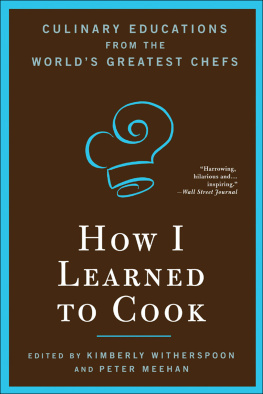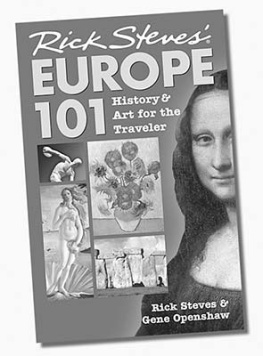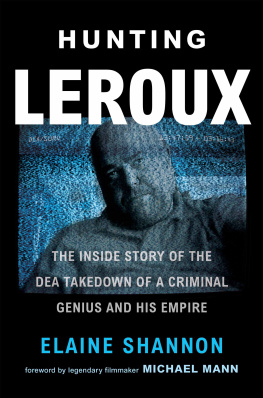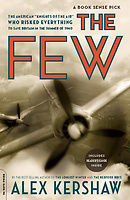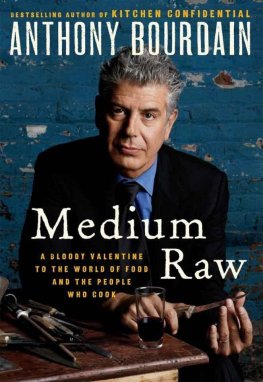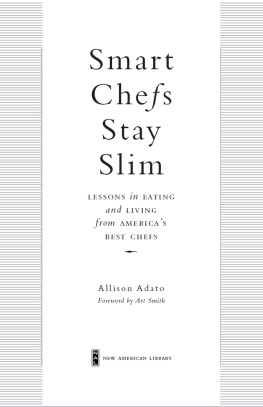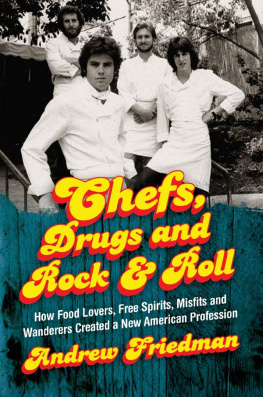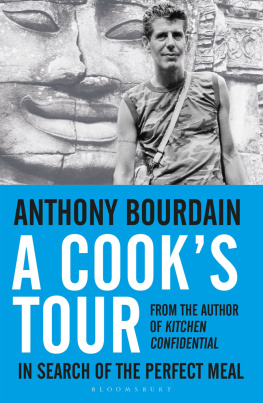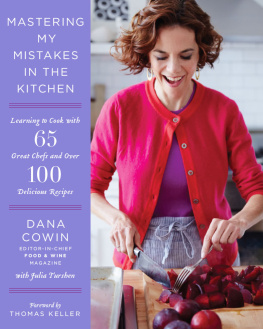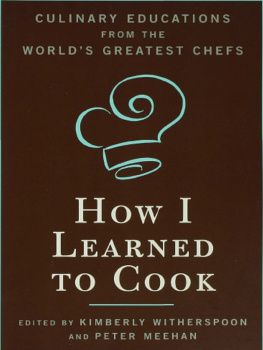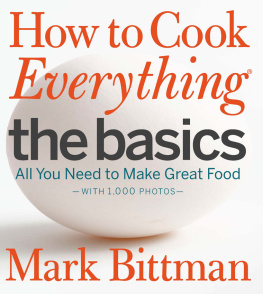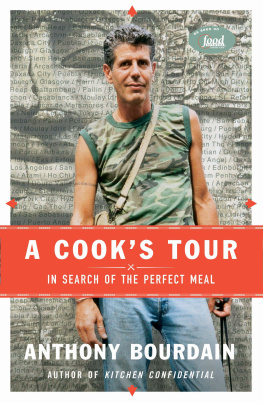"Foodie/chef groupies... who are more star-struck by the likes of Jacques Pepin than George Clooney, could easily devour this book in a single marathon reading session. But How I Learned to Cook is best savored in small bitesan essay here, a couple of essays thereto allow the page-by-page feast to linger a little longer."
San Diego Union-Tribune
"How I Learned to Cook reassures us that the path to culinary fame is sometimes paved with kitchen fires, exploding fava beans, and unecstatic cherries jubilee."
Vogue
"A collection of savvy, savory essays by 40 of the world's best chefs and food writers... who share their early triumphs, travails, and innovations as up-and-comers before they ascended to culinary stardom."
Elle
"Entertaining and inspiring. The chapter by Chicago's own Rick Bayless alone is worth the book's price."
Chicago Sun-Times
"A satisfying follow-up to Don't Try This at Home... This is not just a book for culinary school students or aspiring professionalsthe inspiration in these chefs' tales works for the weekend cook as well... From cooking under the master French chef Paul Bocuse (Daniel Boulud) to deep-frying at the snack bar of the local swim club (Tom Colicchio)cooks of every ability level will recognize the one constant throughout: passion for good food."
Book Page
"Forty chefs representing notable restaurants all over the world offer a bit of humorous history on how they cut their teeth in the kitchen... the stories are entertaining and well chosen."
Publishers Weekly
HOW I LEARNED TO COOK
HOW I LEARNED
TO COOK
Culinary Educations from
the World's Greatest Chefs
Edited by Kimberly Witherspoon
and Peter Meehan
BLOOMSBURY
Copyright 2006 by Inkwell Management
All rights reserved. No part of this book may be used or reproduced in
any manner whatsoever without written permission from the publisher
except in the case of brief quotations embodied in critical articles or
reviews. For information address Bloomsbury USA, 175 Fifth Avenue,
New York, NY 10010.
Published by Bloomsbury USA, New York
Distributed to the trade by Holtzbrinck Publishers
All papers used by Bloomsbury USA are natural, recyclable products
made from wood grown in well-managed forests. The manufacturing
processes conform to the environmental regulations
of the country of origin.
"The Swim Club" is adapted from Think Like a Chef by Tom Colicchio.
"That's Entertainment" is adapted from The Minimalist Entertains
by Mark Bittman.
Lyrics from "I'm Your Captain": words and music by Grand Funk
Railroad. 1970 by Grand Funk Railroad. All rights controlled and
administered by Storybook Music. All rights reserved. International
copyright secured. Used by permission.
THE LIBRARY OF CONGRESS HAS CATALOGED THE HARDCOVER EDITION
AS FOLLOWS:
How I learned to cook: culinary educations from the world's greatest chefs / edited by Kimberly Witherspoon and Peter Meehan.
p. cm.
Includes bibliographical references and index.
eISBN: 978-1-59691-939-6
1. CooksBiography. I. Witherspoon, Kimberly. II. Meehan, Peter, 1977
TX649.A1H39 2006
641.5092--dc22
[B]
2006027496
First published by Bloomsbury USA in 2006
This paperback edition published in 2007
3 5 7 9 10 8 6 4 2
Typeset by Westchester Book Group
Printed in the United States of America by Quebecor World Fairfield
As always, to Summer and Paul
K.W.
To Hannah
P.F.M
CONTENTS
IF THE TITLE of this book has captured your attention, we'd wager the chances are good that you have your own story, if not several, about how you learned to cook.
We'd also wager that you will hear your story echoed by at least one of the forty essays presented in this volume. Not because all cooks come to the kitchen by the same routefar from it. No, any similarity to your own experience is a consequence of just the opposite virtue: diversity. The world-renowned chefs who generously took the time to reflect on the question, how did you learn to cook? recount here a delightful array of inspirations. From childhood creations to memories of tastes that brought enlightenment, from grueling apprenticeships in legendary kitchens to comic catastrophes brought on by ill-conceived experimentation, these professionals have come across it all. And in witnessing the great breadth and depth of these culinary experiences, the home cook cannot help but share, on occasion, a reassuring sense of familiarity and recognition.
What all of these very different chefs ultimately have in common is best expressed in the aphorism "Cooking, like love, is best entered into with abandon, or not at all." Regardless of their styles and histories, it is this passion that distinguishes themand that frequently leads them in over their heads. And it is the climb back to safety from the precipice of disaster that often makes for such a satisfying journey.
There are also gentler revelations to be shared, like youthful discoveries of Julia Child and Jacques Pepin, mentors unearthed in a treasured book. There are stories that anyone reading this collection will find hard to resist, magical instances when eyes were opened to possibilities that await anyone in the kitchen: an elaborate twenty-four-hour recipe at last turns out right; a nervous newlywed succeeds in delighting her food-obsessed husband.
Other lessons are less enchanting but demonstrate that electrocution, near-asphyxiation, and scalding airborne oil can be very instructive and that death threats, packs of dogs, and crack pipes can all play unexpected roles in a chef's rise to the top.
Throughout the book these chefs also share practical wisdom gained from their experiences, and for that we are grateful because, as one chef has learned from his relationship with the inimitable Madeleine Kamman, learning to cook is not a processor a storythat is ever truly finished.
KIMBERLY WITHERSPOON
PETER MEEHAN
Ferrn Adria began his celebrated culinary career washing dishes at a restaurant in the town of Castelldefels, Spain. He went on to work at various restaurants before serving in the Spanish military at the naval base of Cartagena. In 1984, at the age of twenty-two, he joined the kitchen staff of El Bulli. Only eighteen months later, he became head chef of the restaurantwhich went on to receive its third Michelin star in 1997. Adria's gift for combining unexpected contrasts of flavor, temperature, and texture has won him global acclaim as one of the most creative and inventive culinary geniuses in the world; Gourmet magazine has hailed him as "the Salvador Dali of the kitchen."
I CAME TO COOKING purely by chance; it was not, by any means, a vocation. It unfolded gradually, and rather surprisingly, over several years. It was never a search, a mission, a holy grail.
To begin with, I was not one of those children who, at age six or seven, discovers an enthusiasm for baking cookies. I did not watch, ablaze with curiosity, as my grandmother stirred the family broth. The kitchen in the home where I grew up in Barcelona was a place that delivered regular, honest, solid, uncomplicated meat-and-potato meals. Growing up, as a child and as an adolescent, the goings-on over the kitchen stove were as uninteresting to me as they were incomprehensible.
What did interest me, and keenly, as I ventured deeper into adolescence, was soccer. And parties. And, above all, girls. High school, on the other hand, held no charm for me at all. I was not a bad student. I actually got good grades, especially in economics, the subject it was supposed that I would study in college. But it was in my final year of high school that I realized economics held no appeal for me either. In fact, I was fed up with studying altogether. I didn't see much future in itnot for me. At the age of seventeen what I most wanted to do in the world was to spend the summer in Ibiza. This was 1980. Ibiza, a small Mediterranean island half an hour's flight south and east of Barcelona, was then the party capital of the world. It's still a mecca for party animals. But it was even more so then. It was
Next page
